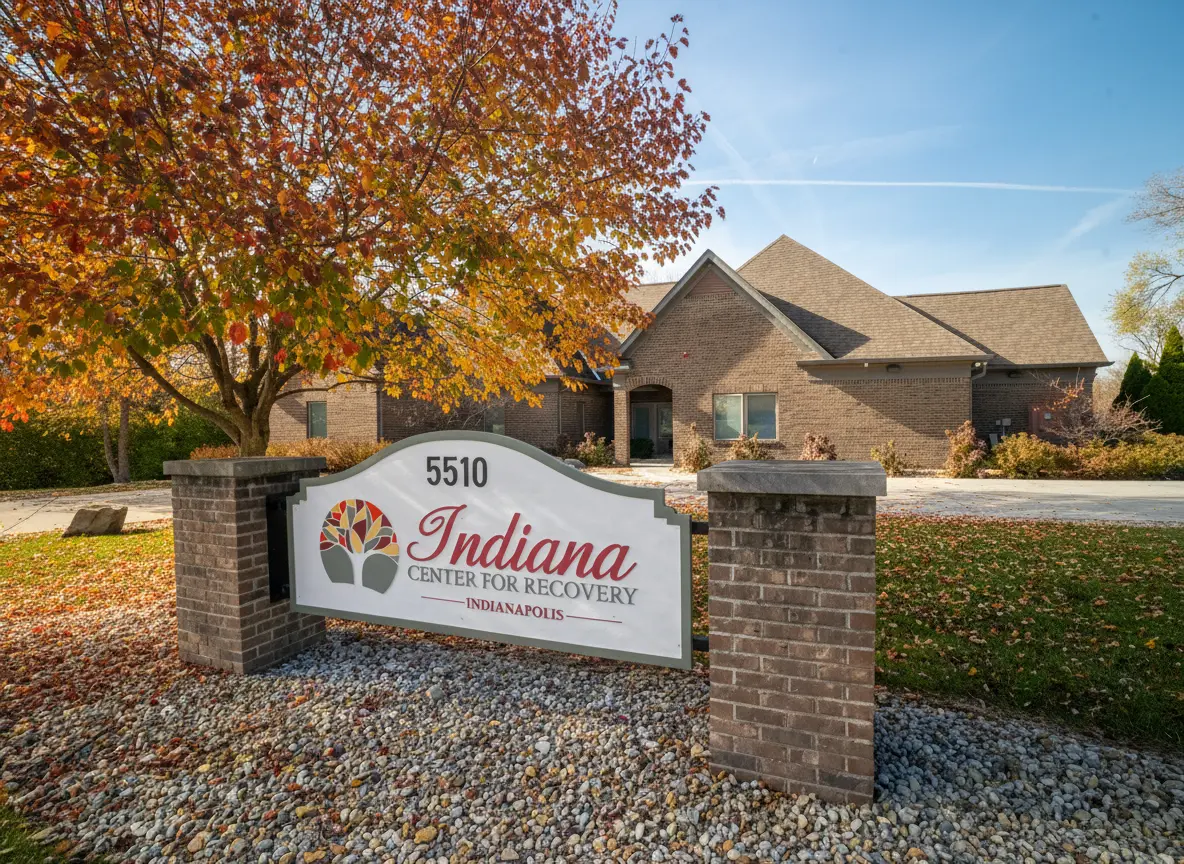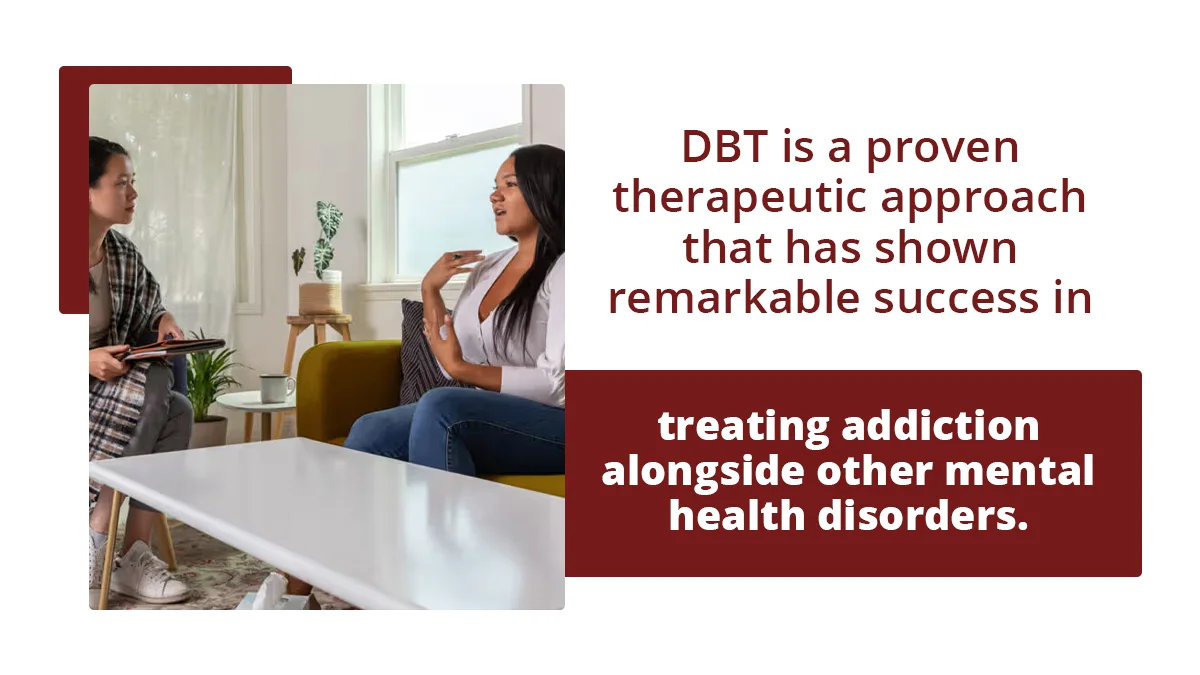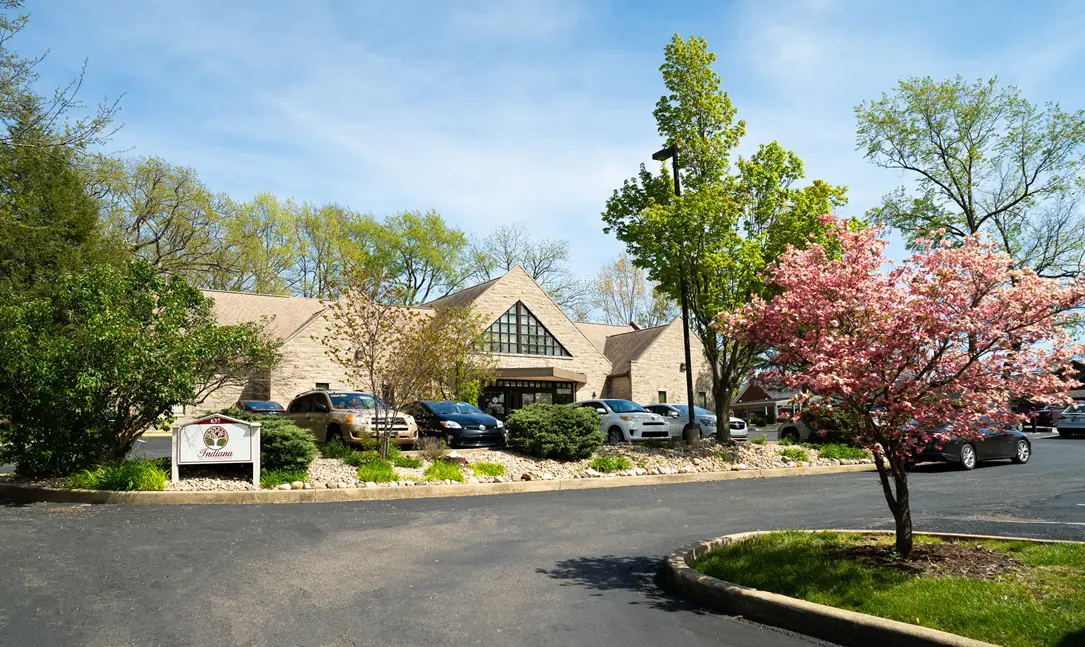
Dialectical Behavior Therapy (DBT)
Addiction is a complex condition affecting millions of individuals and their families worldwide. At Indiana Center For Recovery, we understand the challenges associated with addiction and are committed to providing effective treatment options to support your journey toward recovery.
We are proud to offer evidence-based treatment options like Dialectical Behavior Therapy (DBT). DBT is a proven therapeutic approach that has shown remarkable success in treating addiction alongside other mental health disorders, such as anxiety or depression. If you or a loved one is struggling, reach out to us today to learn more about our services.

Dialectical Behavior Therapy (DBT) Philosophy
Dialectical Behavior Therapy (DBT) is a comprehensive and evidence-based psychotherapy approach that combines elements of cognitive-behavioral therapy (CBT) with principles of dialectics and mindfulness. Developed by Dr. Marsha M. Linehan in the late 1980s, DBT was initially designed to treat individuals with borderline personality disorder (BPD) who were struggling with intense emotions, self-destructive behaviors, and difficulty in interpersonal relationships. Its efficacy has since been recognized in addressing a wide range of mental health challenges, including addiction.
Unlike traditional Cognitive Behavioral Therapy (CBT), which often focuses only on changing thoughts and behaviors, DBT emphasizes the importance of finding a balance between accepting oneself and striving for growth and improvement. This dialectical approach is particularly beneficial in addiction recovery, where individuals may grapple with conflicting desires.
Throughout DBT treatment, individuals participate in a variety of therapeutic activities, including individual therapy sessions, group skills training sessions, and homework assignments. These structured activities help individuals develop practical skills for managing emotions, navigating interpersonal relationships, and coping with life’s challenges without turning to substances.
Dialectical Behavior Therapy (DBT) In Addiction Recovery
Dialectical Behavior Therapy (DBT) addresses the complex factors underlying substance abuse disorder. Different from traditional approaches that may focus solely on symptom management or abstinence, DBT offers a comprehensive framework that integrates evidence-based strategies for emotional regulation, distress tolerance, mindfulness, and interpersonal effectiveness.
Many individuals struggling with addiction use substances as a way to cope with intense emotions, past traumas, or challenging life circumstances. DBT equips individuals with the skills and tools needed to identify, understand, and manage their emotions in healthier ways, reducing the reliance on substances as a coping mechanism.
Additionally, DBT incorporates principles of mindfulness, which are particularly beneficial in addiction treatment. Mindfulness skills teach individuals to cultivate nonjudgmental awareness of their thoughts, emotions, and bodily sensations in the present moment. This heightened awareness allows individuals to recognize triggers for substance use, develop alternative coping strategies, and make healthier choices in their recovery journey.
Components of Dialectical Behavior Therapy (DBT)
Each component of dialectical behavior therapy addresses specific areas of challenge commonly experienced by individuals struggling with addiction and other mental health concerns. DBT provides individuals with a comprehensive toolkit for navigating life’s challenges and reaching a sustainable recovery from substance use. Here are a few key components of DBT:
Mindfulness
Mindfulness helps individuals develop greater awareness of their thoughts, emotions, and bodily sensations, allowing them to respond to life’s challenges with clarity and composure.
Distress Tolerance
Distress tolerance teaches individuals how to tolerate and cope with distressing emotions without resorting to harmful or self-destructive behaviors.
Emotion Regulation
Emotion regulation helps individuals recognize and label their emotions, develop healthy coping mechanisms, and challenge unhelpful beliefs about emotions.
Interpersonal Effectiveness
Interpersonal effectiveness helps individuals improve communication, assertiveness, conflict resolution skills, setting boundaries, and building mutually satisfying relationships.
By embracing the holistic approach of DBT, individuals in recovery can begin a journey of self-discovery, growth, and transformation, creating a clearer path for a fulfilling and substance-free life.
Benefits Of Dialectical Behavior Therapy (DBT)
One of the main benefits of DBT in addiction recovery is its effectiveness in addressing emotional dysregulation, which is a common aspect of substance use disorders. By teaching individuals mindfulness skills and emotion regulation techniques, DBT equips them with the tools needed to identify, understand, and manage their emotions in healthier ways. This not only reduces the intensity of cravings and urges to use substances but also helps individuals develop greater emotional resilience and stability in the face of life’s challenges.
Additionally, DBT emphasizes the importance of interpersonal effectiveness skills for maintaining healthy relationships and social support networks in recovery. Through DBT, individuals learn effective communication strategies, assertiveness, and boundary-setting techniques, enabling them to navigate interpersonal conflicts and build stronger, more supportive connections with others. Through its emphasis on self-acceptance, change, and connection, DBT offers hope and healing to individuals seeking to reclaim their well-being and thrive in sobriety.
What Can DBT Help Treat?
The holistic and evidence-based principles of dialectical behavior therapy make it suitable for individuals struggling with various conditions that may co-occur with addiction or contribute to its development. Here are some of the issues that DBT can help treat:
- Substance abuse disorders
- Borderline personality disorder (BPD)
- Depression and anxiety disorders
- Post-traumatic stress disorder (PTSD)
Overall, DBT is a versatile and comprehensive therapy approach that can help individuals struggling with a wide range of mental health challenges, including addiction. Its flexible nature and evidence-based techniques make it an invaluable tool in promoting recovery, resilience, and overall well-being.
DBT Therapy at Indiana Center For Recovery
If you’re struggling with addiction, borderline personality disorder, PTSD, or depression and anxiety, DBT therapy offers a comprehensive approach to help you manage intense emotions and build healthier coping skills. Studies show that DBT provides effective treatment for emotional regulation, distress tolerance, mindfulness, and interpersonal effectiveness by teaching you to balance acceptance with growth. At Indiana Center for Recovery, our trained therapists use DBT therapy as part of comprehensive treatment programs for addiction treatment and mental health conditions, addressing the emotional dysregulation and trauma that often underlies both conditions. Our integrated dual diagnosis treatment uses DBT therapy to address the root causes of emotional distress while treating mental health and substance use disorders simultaneously.
Don’t let intense emotions continue to control your life. We offer treatment centers across Indiana where our trained therapists provide DBT therapy as part of comprehensive treatment programs that include inpatient psychiatric services, residential treatment, and flexible outpatient treatment options. Our compassionate team will work with you to develop a personalized treatment plan that includes DBT therapy, medication management when needed, and ongoing support to help you heal. Call us right now at (844) 650-0064 to speak with our team and learn how DBT therapy can help you build emotional resilience and start your journey toward recovery.



 100% Confidential
100% Confidential
